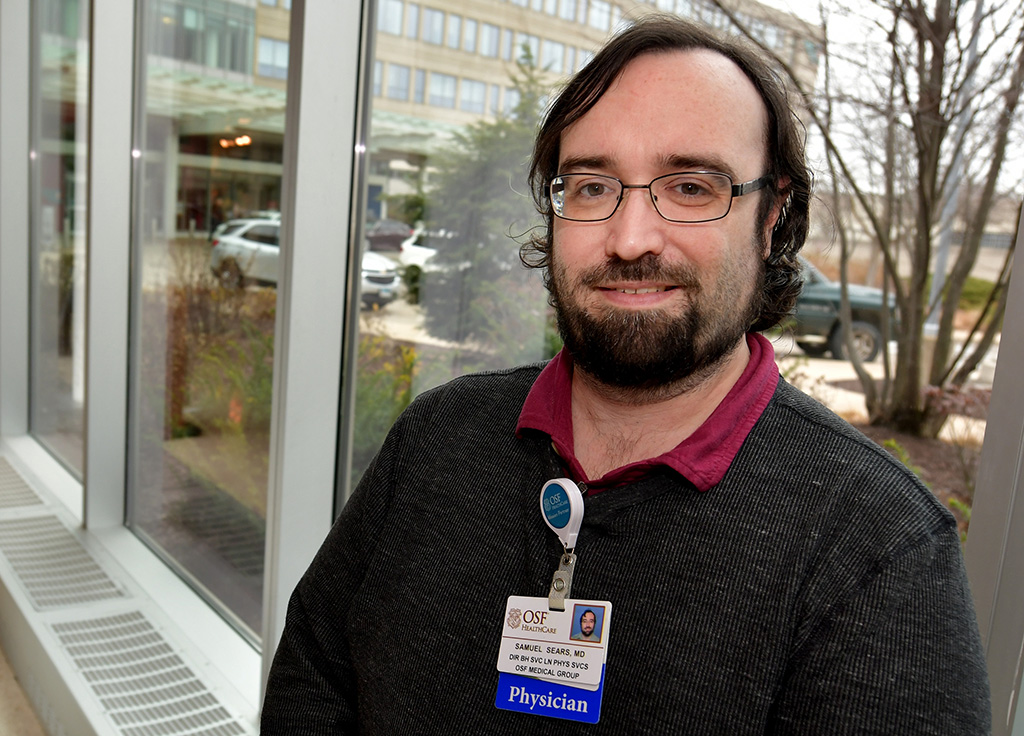OSF unveils plans to build the state’s largest psychiatric hospital outside Chicago area.
It’s no secret that there is a mental health crisis in the United States.
According to a 2022 study by Mental Health America, nearly 50 million adults, or 19.6% of the population, suffered from a mental illness in 2019. The number grew to 21.6% in 2021, largely due to the COVID-19 pandemic.
In Illinois alone in 2021, more than 400,000 adults experienced serious mental illness ranging from acute and/or chronic depression to anxiety, schizophrenia and mood or personal disorders, according to the National Alliance of Mental Health (NAMI).
More than half received no treatment due to a lack of services, of awareness, of affordability, or because of the stigma that remains attached to mental illness.
OSF HealthCare hopes to improve all of those dynamics with plans to build Illinois’ largest psychiatric hospital outside the Chicago metro area.
Teaming up, filling a void
On the drawing board is a 100-bed adult behavioral health hospital in north Peoria that will offer a full continuum of mental health services, including a 24/7 crisis center. In partnership with US HealthVest, OSF hopes to build the facility on a tract of land it already owns on Route 91. If approved by state regulators, the new hospital could open in late 2024 or early 2025.
Dr. Sam Sears, OSF’s director of behavioral health physician services, is heavily involved in the planning of the facility and explained how the partnership came to be.
“It was actually a mix of great need and some darn good fortune,” he said. “US HealthVest is a developer of psychiatric hospitals with locations around the country, including three facilities in the Chicago area. We often send our patients to their facilities when no inpatient beds are available locally. In talking with them about an opportunity to bring an adult behavioral health facility to the Tri-County area, we felt confident in their ability to meet our community’s needs and help us scale this initiative effectively.”
OSF Vice President of Business Development Emily Shields helped vet US HealthVest as a potential teammate.
“Specialized behavioral health programs are specific to individuals with complex medical and mental health needs, and we currently just don’t have those capabilities,” she said. “Partnering with a company that already has a successful behavioral health care model allows us to bring these services to central Illinois.”
OSF currently has adult inpatient behavioral health units at its hospitals in Ottawa and Champaign-Urbana, each under 15 beds. The new facility will house 100 beds on multiple floors.
Meanwhile, US HealthVest will recruit an estimated 200 full-time employees for the facility, with positions ranging from psychiatrists and therapists to nurses and technicians, care coordinators, cooks and cleaning crews.
“A facility like this will be a draw to central Illinois,” Shields said. “We’ll be able to offer employees training and resources at all levels of the organization, which will only increase the number of skilled, talented individuals in our community.”
‘Getting folks back to living the best lives they can’
Inpatient behavioral health care is the highest level of intervention for individuals experiencing serious mental illness, enabling patients to focus on their recovery in a safe, supportive environment.
In addition to diagnosis and treatment, patients receive individual therapy and participate in groups focused on topics including medication management, relaxation techniques and coping skills.
The average length of stay is usually around 10 days, though it ranges. “You don’t want a patient’s stay to be any shorter than it needs to be, but you don’t want it to be any longer, either,” explained Sears. “There’s a balance between making sure we’ve treated someone to have enough stability to effectively transition to outpatient services, but not keep them so long that they become dependent on an artificial environment of support.”
What’s most important upon discharge, he said, is making sure patients have an appropriate diagnosis and proper medications, along with a follow-up care plan to continue the gains they made during their inpatient stay.
Depending upon the severity of the illness, the latter can include a residential treatment center; outpatient services such as a partial hospitalization program (PHP), structured outpatient therapy-based support and comprehensive psychological care in a group setting; or intense outpatient therapy (IOP), which is similar but shorter in duration.
“The PHP and IOP programs at the new facility will be geared toward individuals who are stepping down from an inpatient stay,” said Shields. “The current PHP and IOP programs OSF offers will continue as ambulatory services for those who do not require that higher level of care.”
Having that support close to home is vital to both the patient’s comfort level and knowledge of available services. “Arranging follow-up care for a patient who is two or three hours away from home can be difficult,” said Sears. “The closer you are to home when you’re receiving inpatient care, the more familiar those helping arrange follow-up care will be about the most appropriate services available.
“The majority of individuals are able to return to their communities after inpatient treatment,” added Sears. “We really are focused on a recovery model and getting folks back to living the best lives they can, as independently as possible.”
Meeting a Critical — and Soaring — Need
Every three years, area hospitals and health departments, in conjunction with Bradley University and Heart of Illinois United Way, conduct a Community Health Needs Assessment (CHNA) for the Tri-County region.
According to the 2022 CHNA, mental health — specifically revolving around depression, anxiety and suicide — was rated near the top of the health issues confronting Peoria, Tazewell and Woodford counties.
Case in point, the survey asked respondents to self-assess their overall mental health status. “Good” mental health status fell dramatically between 2016 and 2022, from 72% down to 19%. In 2019, only 8% of respondents answered “poor.” In 2022, that percentage doubled, to 16%.
“People with serious mental illness still die on average about 20 years younger than an average individual — and that’s not right,” said Sears. “We can do better as a society and make sure they have access to appropriate treatment and that they have good support wrapped around them.”
“We are making good strides as a community,” he continued. “UnityPoint is increasing their child and adolescent behavioral health services with the Young Minds Project, renovating the former Heddington Oaks building into a youth behavioral health facility. We have a partner in US HealthVest that will help us expand the adult behavioral health services in central Illinois.
‘for people with serious mental illness… we can do better as a society’— DR. SAM SEARS
“That’s the true definition of a community approach and what addressing the needs of the community really looks like, and I’m proud that we’re doing our part to help build on that.”
ADULT MENTAL HEALTH RESOURCES
OSF Behavioral and Mental Health (309) 624-9522
OSF Behavioral Health Navigators Toll-free (833) 713-7100
UnityPoint Health and Peoria County Emergency Response Service (309) 671-8084
988 Suicide & Crisis Lifeline (formerly known as the National Suicide Prevention Lifeline) offers 24/7 call, text and chat access to trained crisis counselors who can help people experiencing suicidal, substance use, and/or mental health crisis, or any other emotional distress.
Veterans Crisis Line 1-800-273-TALK (8255), Option 1





